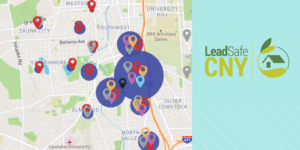A few toys can bring much joy to a child undergoing chemotherapy treatments at the new Dr. William J. Waters Center for Children’s Cancer and Blood Disorders, housed at the new Upstate Cancer Center. The hallmark of the new center is an infusion “playroom” that is filled from top to bottom with park-themed interactive activities, toys, and games for the children and teens passing through its doors.
The newly opened Cancer Center offers a full range of services and care including prevention, early detection, genetic counseling, treatment, surgical and inpatient care, and survivorship counseling. The playroom features private infusion rooms as well as an open setting for those who might like to socialize during their treatment.
“We really wanted this room to be as inviting as possible, filled with lots of light, vibrant colors, and interactive activities,” said Donald Zorn, cancer campaign manager and director of development for strategic initiatives. “The children are going to be here getting chemo treatments for anywhere from 30 minutes to a couple of hours, and we want to make it as pleasant for them as possible.”
The infusion playroom was made possible in part by a Community Foundation grant, which was used to outfit the space with child-friendly furnishings. The room is unique in that every inch of space is utilized in creative ways with the interests of infants and toddlers, children, teens, and even visiting parents in mind. Floor-to-ceiling windows spanning the entire length of the playroom overlook a second floor rooftop healing garden that features four seasons of greenery to provide patients with something pleasant to look out at all year round.
Painted murals of fluffy clouds, blue skies, trees and forests complete the transformation of the children’s area into a joyful, park-themed space. One look downward and they will find a vinyl river, interactive “liquid motion” medallions, and leaves that light up when stepped on, flowing throughout the floor.
The former infusion room at Upstate Cancer Center, where chemotherapy was administered, conducted 800 treatments each month. It is expected that the new infusion center will greatly increase that capacity.









